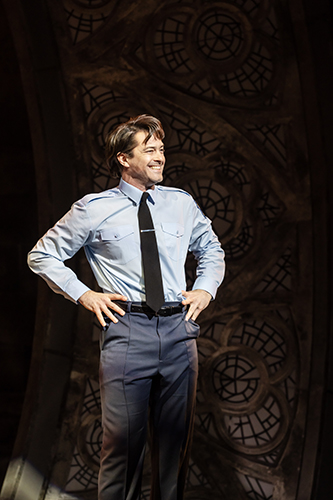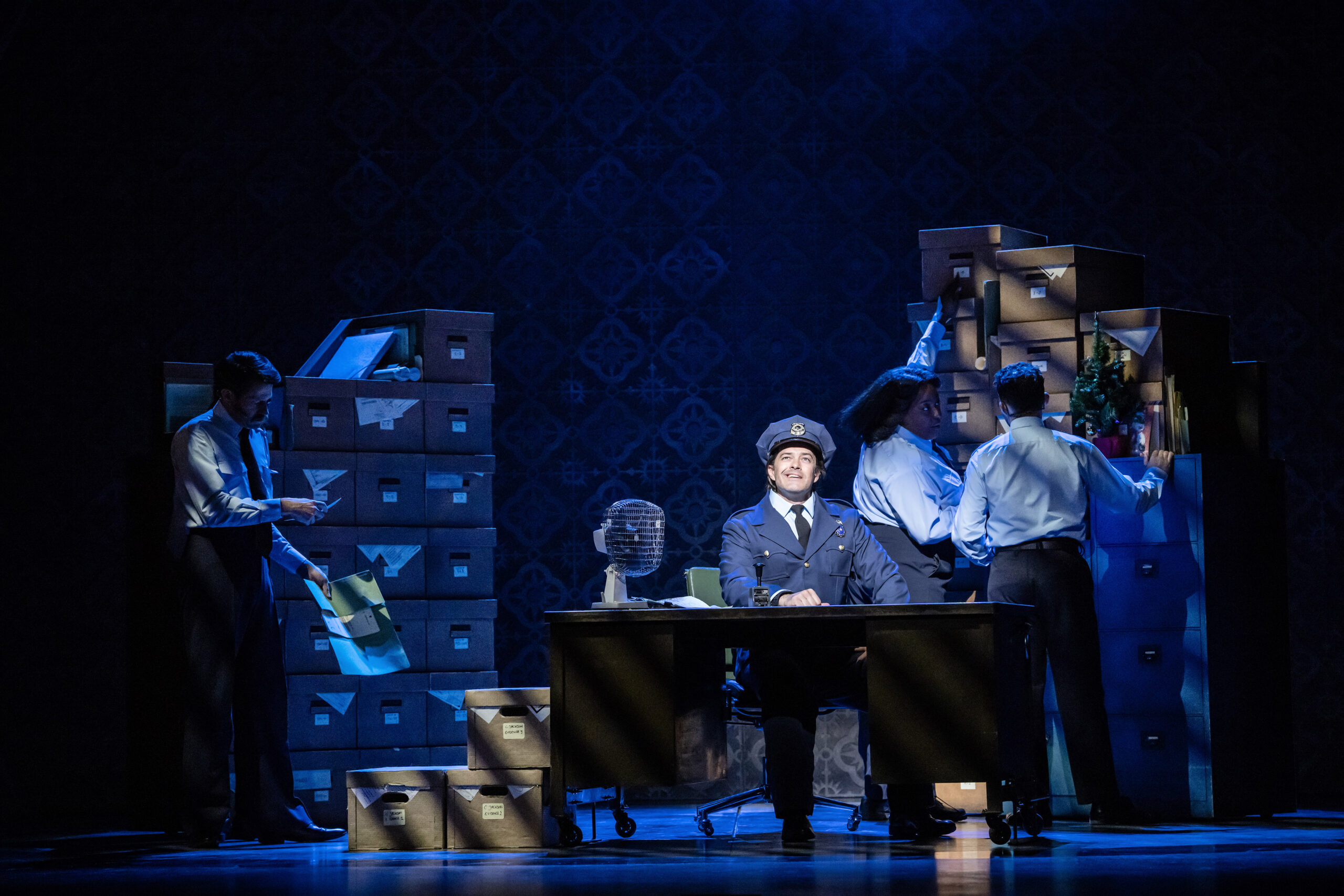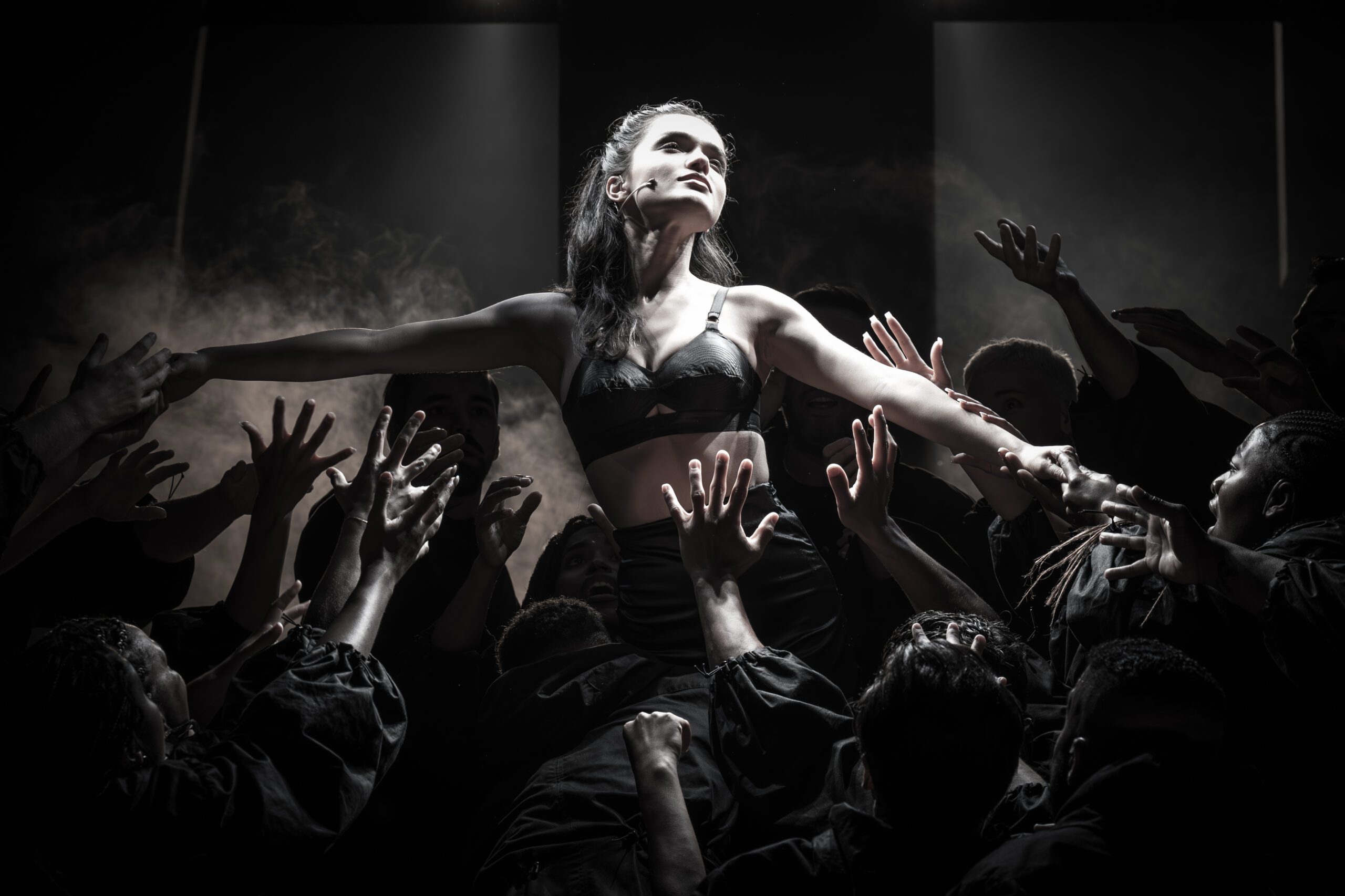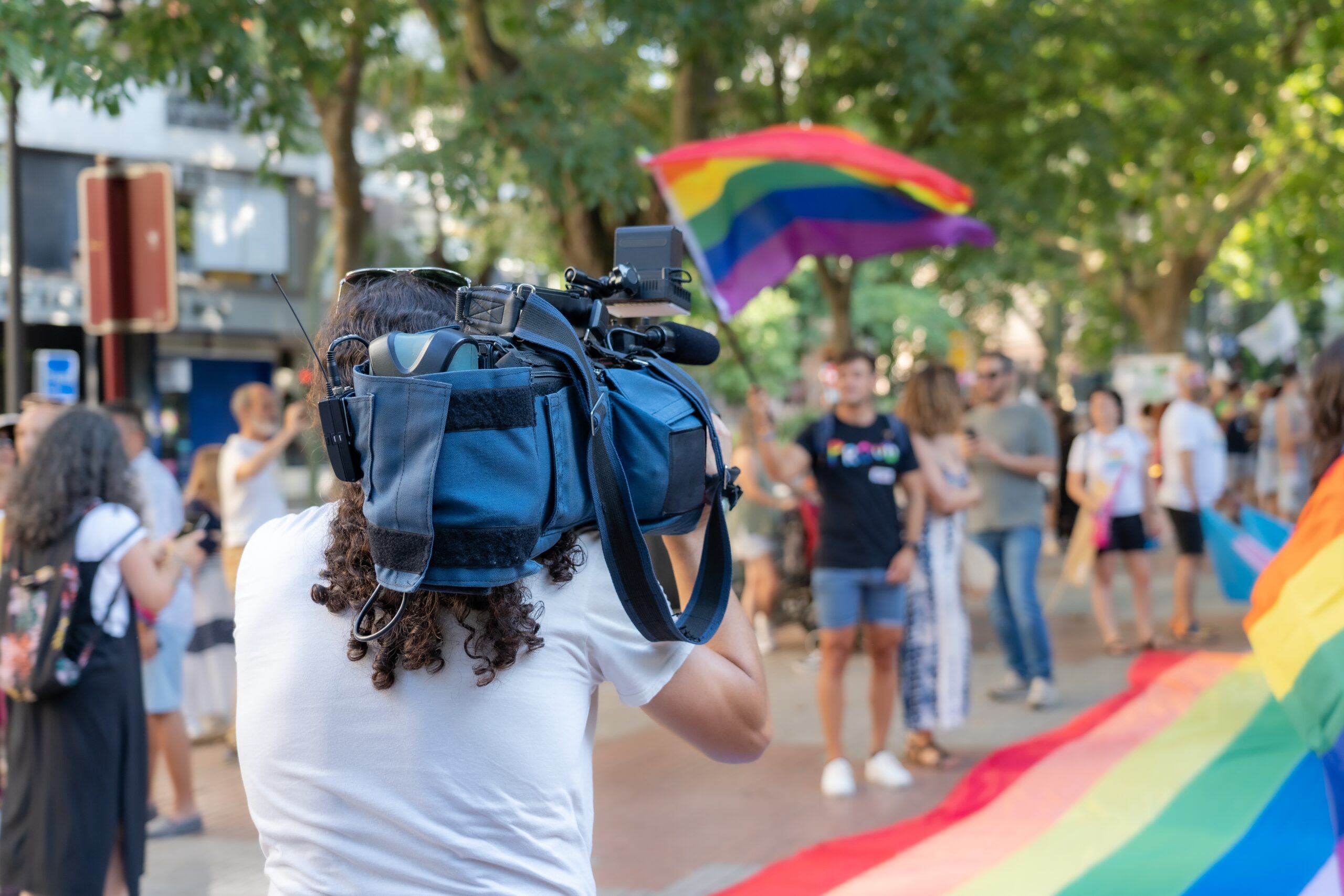Lee Mead shares his acting experience, from ‘Joseph’ to jumping into his new ‘Sister Act’ role, plus his vocal care tips.
As a nation, we first got to know Lee Mead through the TV show phenomenon Any Dream Will Do, which saw Andrew Lloyd Webber searching for the perfect actor to play ‘Joseph’ in Joseph and the Amazing Technicolor Dreamcoat. Lee, of course, was the winner, and has since had an amazing career spanning popular West End shows like The Phantom of the Opera and Wicked, television appearances, pantomimes, singing tours, albums and, most recently, Sister Act at the Dominion Theatre in London.
We couldn’t wait to see Lee step into the role of policeman ‘Eddie Souther’, and fortunately, we had the chance to talk to him about this exciting new part, plus his experience acting for stage and screen and tips for maintaining your stage stamina and singing voice. Here’s what he shared:
Hi Lee! What first drew you to a career in the performing arts?
I don’t know really. I wasn’t one of these stage-schooled kids tap dancing in the kitchen. I didn’t start until I was about 15, and my drama teacher cast me in a school production of Grease as ‘Danny Zuko’. The second I put on that leather jacket, I’d caught the bug and I absolutely loved it. It was a huge school production of about 60 in the cast, and I was in shock when my drama teachers cast me in the role and saw potential in me. I was absolutely terrible, in my opinion, but it was all about having fun and being part of a group.
Prior to that, my clearest early memory of loving theatre and musicals was probably being on the sofa with Mum and watching Oliver the film, which is such a classic. Mum woke me up – I was only about six or seven, and it felt like it was midnight, but it was 6pm – and she brought me downstairs on the sofa, pulled a blanket over us, and we watched the whole film. I was mesmerised by all the songs and that great score.
So I have a lot of memories like that, but never in a million years did I think I’d make a career from performing or it would end up being my job!
You got your big break through the reality TV show ‘Any Dream Will Do’. Could you tell us a bit about that experience?
“I did 600 performances in a year and a half and just had the most incredible time. It was amazing.”
It was just amazing. Such an incredible time and very surreal. I always just dreamed of having a career – even being in the ensemble of a show. My first couple of jobs were in Yorkshire at a car ferry as a singer, but the dream was always to be in the West End and play a leading role. Joseph and the Amazing Technicolor Dreamcoat was the very first musical I ever saw in my local theatre in Southend at the Cliffs Pavilion. I was about 13 and I remember this guy coming out in this multicoloured coat and being mesmerised and thinking, “Wow, this is such a cool show.”
Suddenly, you’re getting further and further in this competition. I think just over 10,000 guys auditioned for the role, and it’s like winning the lottery. You never imagined you’d get that far even. It was over six months and many, many recalls, and I made the live TV show – the last 12. And each week, I’m thinking, “Surely it’s my week to get knocked off.” And I kept going and going, and then got to the final with Keith Jack, who’s now one of my best friends in the world, and I ended up winning the role. For whatever reason, it was my time.
I went on to record a music video, have a number two single and play the role in the West End. I did 600 performances in a year and a half and just had the most incredible time. It was amazing.
Even now, there’s at least one person that will stop me every day and say, “Oh, we voted for you,” or “We saw you in London.” It was such a huge show and I’m so grateful for that time. It opened up my whole career. The profile from that TV show led on to so many other great things.
What has been your favourite role so far?
Joseph. I love that show so much. I’ve got such a passion for it and I always will. It changed my life, but even prior to winning that show, it was always my favourite musical.
Also, being in The Phantom of the Opera, which I played the role of ‘Raoul’ for. I played that role about 70 times and that’s a great show to be a part of as well. I still think it’s probably Andrew Lloyd Webber’s greatest work musically.
Your latest show is ‘Sister Act’. Could you tell us how this came about?
I can’t wait to play Eddie Souther. He’s a bit of a nerdy character, but a good guy. He’s got good morals, but he falls for Dolores, obviously. And I’ve got a great song in the first half as well, which I’m really excited about – I Could Be That Guy – and I’m just learning it at the moment, finding it in my voice.
I still audition for roles. At the end of last year, I played the role of ‘Billy Flynn’ in Chicago, and I auditioned for that role. I only had, I think, two auditions. The further you go on your career, and hopefully build your CV to a level where people know what you can do, then you’re not in for six, seven, eight auditions.
But the role [of Eddie Souther] was actually a straight offer, so I didn’t need to audition, which is really nice and doesn’t always happen. Producers and casting people, they sort of know what you’ve done and what you’re capable of and know what role they want to cast.
It was lovely to be asked to do Sister Act and I can’t wait to get into Eddie now and start rehearsals and find those little nuances and make him my own as well. There’s an actor called Clive Rowe – he’s brilliant. I saw him play Eddie last week. I popped into the show just to get inspired, but my Eddie will be completely different to Clive’s, and it should be as well.

Lee Mead as ‘Eddie Souther’ in ‘Sister Act’ / Image credit: Johan Persson
What does an average day look like for you when you’re appearing on the West End?
I’m always on the school runs for my kids, so I’m up at 6:30am most days. Generally, it’s a school run, gym and then a bit of writing during the day. And being based in Kent, I need to leave a good couple of hours to be in time for work. Call time’s around 6pm for vocal and physical warmups, so I’ll leave around four-ish. For the matinee days I need to be in a lot earlier, so I’ll leave the house at about 10am.
The days vary really. At the moment, I’m trying to write my first play with my friend, Suzie Chard, who’s a brilliant actress. I did panto with her at the Palladium a few years back, and we have about 10 writing sessions now. It’s really coming together, and I’m hoping to bring it to the Edinburgh Festival in about two years’ time and pitch it to producers.
So, this summer, a lot of my days will be spent with at least a couple of hours a day writing. I tend to have a big lunch because there’s not time for dinner because your call time’s 6pm for the show and you don’t really want to be eating a big meal before a show that night. Then I might grab something small backstage before the show, like some sliced apple or crisps, and then go and do the show.
It is nice, when you’re walking into work, you walk around the theatre at the stage door and sometimes you see the audience pre-show and meet people at the stage door. It’s important to give your time to people that want to chat and sign stuff.
How do you maintain your stamina and voice between performances?
“You should never over-sing too much for a warmup, because then you can tire the voice.”
It depends on the role. ‘Khashoggi’, last year, in We Will Rock You was really exhausting because I sang Seven Seas of Rhye. It’s a big vocal song, and I decided to do it differently and sing full out. Physically, it’s a massive number. It’s not a massive role in the show, but I did finish that every night dripping in sweat, exhausted.
Generally, you’ve just got to look after yourself, hence why I go to the gym each day to do some cardio and a lightweight workout. I eat very healthily, I’m not a big drinker. I like a nice glass of wine with dinner, but I don’t drink every day or every night. I may only have a couple of pints a week and drink lots of water. I make sure I get good sleep and rest as well. All that contributes to the voice.
If you’ve been singing a long time, like myself, [the voice is] like any muscle. If you’re an athlete or runner, it becomes part of your daily life, so there’s not too much you need to do apart from look after it and not abuse it too much.
How do you warm up your voice when you’re preparing for a show?
We have vocal warmups every day, usually for about 15 or 20 minutes. There’s a bit of a myth that you need to warm your voice up lots as a singer, but you actually don’t. From the second you wake up or you’re talking, ordering a coffee or speaking throughout the day, that’s your voice warming itself up.
If you’ve got a big vocal number, have a proper vocal warm up. But I was always told early on by a great singing teacher that you should never over-sing too much for a warmup, because then you can tire the voice.
It’s one of my biggest regrets, actually. I was down to the last two or three for the role of the ‘Phantom’ just over a year ago. I sang for Cameron Mackintosh for the final. It might’ve been the last two for the role. It was a rookie mistake – I was asked to sing over the material for a good 45 minutes to an hour before Cameron arrived. And we’re singing over and over and over and over, and I should have taken control and actually said, “Do you mind if we just stop for a bit and just rest the voice before the final audition?” The lower part of my voice ended up being so tired that it went.
Come the show, on any performance, you’re doing it just the once that night, not 10 times before you sing for someone. So you don’t need big, long, huge vocal warmups. If you’re an opera singer, I don’t know if that’s different, but again, look after the voice and warm it up.
As well as West End musicals, you’ve also had roles in TV productions like ‘Holby City’, ‘Motherland’ and ‘The Dumping Ground’. How does screen acting compare to stage acting?
“With TV, especially, they shoot very quickly, so you’ve got to know your script and you’ll know the next day what scenes you’re doing.”
It’s a different way of work. You’re up early every day, unless you’ve got a tiny cameo. But even if you’ve got a cameo or a guest episode, depending on the size of the role, they condense your days filming. So you might have just four days, but intense days. So you’re up at 6am and you’re on set for 7:30am make-up and it’s a long 12-15 hour day. A lot longer days than theatre, and you can’t sleep in.
You need to be giving a lot less on camera in terms of the performance. The gestures aren’t going to be as big as theatre, but you still need to be focused and understand what you’re trying to put across, whatever the script is saying and the character. But it’s more minimal with TV because the camera obviously picks everything up.
With TV, especially, they shoot very quickly, so you’ve got to know your script and you’ll know the next day what scenes you’re doing. It might be only six pages, but make sure you’ve got your lines ready for the next day to film. You go on set, have a quick readthrough with the director, talk about the scene, and then you shoot and that’s it.
And, obviously, it’s seen by a bigger audience. I think when I did Casualty, one episode goes out to 5 million people, which is the equivalent of doing eight theatre performances a week for three years. It’s a wider audience, but the feeling of live theatre and having a live audience is, for me, greater than doing TV. Nothing compares to that live reaction.
Generally, with screen work, when the director has the shot they want, they move on. And with theatre, you get to do it eight times a week or night after night. And that’s a challenge in itself, depending on what the character and scene is.
Theatre requires more consistency and stamina. It’s, in some ways, more disciplined, because you have to repeat that performance night after night at the same level. You can’t give any less than the night before. But you do get into a rhythm, once you’ve locked down a character and rehearsed the role, which is what rehearsals are for, for all the nuances and finding the song in your voice. Then you put it in front of an audience and find the rhythm and where the laughs are and how you’re going to play that part. After a few shows, you know where to pitch the part, so it becomes second nature.
But if you’re on a long run in a show or play, then the challenge as an actor is to not coast and clock in the performance and go into autopilot. You’ve got to be present and in the moment, which becomes the next challenge as well.
But having a live audience, that does help you a lot because every audience is different and brings a different energy.
If you could change one thing about the industry, what do you think it would be?
I’m from a very working class background, and we didn’t have much money growing up. There are more opportunities now for kids from working class backgrounds to go to RADA or big London schools, more so than when I started off myself.
I went to a local college, which obviously wasn’t as good or as big as a London college, and then left early and started doing cabaret and car ferries and summer seasons and cut my teeth that way, which is not a bad thing, but I wasn’t fortunate enough to have the technique at a top drama school. There’s so many more people now that want to do it as well. So even getting into the college, there’s so much competition. And then when you graduate, you’re up against 100 people for a role, so it’s very tough.
I guess what I’m trying to say is I think it is more common, but perhaps we need to support more community with theatre. The arts is always something that’s important, and we need to be giving everybody an opportunity that may not have that opportunity, because there’s so much talent out there, real talent that wouldn’t often have the chance.
I think it’s important for all people to experience the arts in music, drama, in every aspect, just to help you as a person and release your feelings and self-expression and confidence and how you want to be perceived in the world. I popped into a school the other day to sing for some kids and they were so happy that I gave out some awards, had a chat with them – an inspiring chat about achieving their dreams and telling them that if you’re passionate and work hard enough, you can do anything you want in life. With drama and music, it gives people that confidence and that chance to express themselves, which all of us should experience.
Finally, what are you working on at the moment?
The last two or three months, I’ve been working on two projects. I’ve always wanted to write my own play. I think I’d mentioned my friend Suzie Chard. We’re working towards this comedy play, and it’s really gritty and real and I can’t give too much away on both projects because it’s early stages. But we had about 10 or so writing sessions and we’re hoping over the next year and a half to two years we can really finish it off and pitch it.
The other one is a TV comedy series with Nicola Larder, who’s created a lot of big shows like Marcella with Anna Friel on ITV, and Cobra with Robert Carlyle on Sky TV. She said to me last summer, “You’ve got great comic timing. I’d love us to write something together and work on something.”
It’s important in this game to keep creative all the time, even if you’re not in between jobs, which I always do. And I’ll be releasing another album hopefully in about a year and a half as well and doing a tour with the band. There’s always things to be doing and keeping creative, and then when it comes to that point, hopefully you’ve got more things to do.
A massive thanks to Lee for taking the time to talk to us! Tickets for ‘Sister Act’ are available to book now.
Take a look at our website for more casting stories and interviews with casting directors and agents.



















